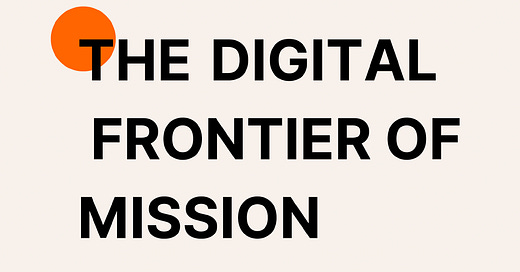The Digital Frontier of Mission (Free Download)
Download the latest update on my current research
Digital technology continues to integrate itself into the lifeblood of what it means to be human in the 21st century. I still remember the first time I encountered the internet, around 1996 in the library of Armstrong Middle School in my home town of Flint, Michigan. The school had just received a fresh batch of computers to upgrade its woefully outdated computer lab and they were teaching us how to use search engines to look up information on the internet. I walked away thinking the internet was a giant waste of time…why poke around on a computer for information when all of these encyclopedias are right here in the library?
Now, like many of you, the internet is in my pocket and on my wrist. Shoot, my dishwasher has wifi connectivity. While I have a deep appreciation for an old encyclopedia set, I can’t imagine poking around in a print encyclopedia for information instead of simply Googling the answer I seek.
We now live in a seamless, hybrid sort of existence. Nobody “logs online” anymore. We’re always online in a sense. And that reality is not going away, especially as Web 3.0 continues to change the way we engage with digital technology.
But, if those of us in ministry are honest with ourselves, our strategies for using digital technology for ministry––and especially ministering to people in digital spaces and places, are still outfitted for the sort of technological landscape that gave shape to movies like You’ve Got Mail and television shows like Alias. Many church leaders feel ill equipped to leverage technological advances, or feel that digital ministry is a peripheral component to “real ministry”—a luxury for churches with large budgets and staffs.
But I disagree.
Digital places and spaces are not only integral to effective missional engagement in contemporary culture, it is the next great frontier in the Church’s participation in God’s reconciliatory mission in the world. We need better strategies to equip the church to go where the people are—and nearly everyone is online.
Since the beginning of the year I’ve been honored to serve as lead researcher of the Digital Mission Consortia, an initiative formed out of a partnership between Wheaton College Billy Graham Center, OneHope, and others to explore the frontier of digital ministry. Recently, we unveiled a white paper report at the Empowered21 conference in Amsterdam, detailing our preliminary findings six months into this research endeavor.




